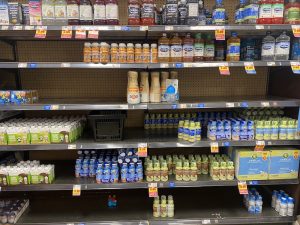The feasting season is also the season for food waste. According to the Worldwatch Institute the amount of discarded food in the U.S. increases by a third between Thanksgiving and Christmas. Composting helps with some of that. Year-round, compostable material makes up between a third and a half of residential waste produced in the U.S, according to the Institute for Local Self Reliance. Unfortunately, the EPA reports that in 2012 (the most recent year for which figures are available), 72 percent of that potentially reusable waste was sent to landfills. In short, it’s complicated. Here are four angles on the topic to research in communities large and small.
Infrastructure gaps
There is both a high supply of compostable materials and a high demand for compost. The problem is building the infrastructure to convert one into the other. Compost, especially food scraps, is difficult to transport and requires costly equipment in order to make clean, pathogen-free products. Because of this, about 70 percent of facilities focus on yard trimmings, which are lighter to transport and easier to process. Yard trimmings have a recovery rate more than ten times that of food scraps. One solution is to process compost on a smaller scale, eliminating the need for long-distance transportation. Local operations can also be easier to manage that those attempting to process much more tonnage. The simplest option, backyard composting, has also been on the rise.
Jump start from the government
In many places the local or state government has been the first to begin composting efforts. In Massachusetts, Connecticut and Vermont, it is illegal for a commercial business to put food items in the trash. Many states have focused on private citizens, setting composting goals or providing compost or yard waste collection options for residents. Hawaii provides free backyard compost bins for any resident who agrees to take a short composting class. Phoenix has just started a free residential yard waste collection program and hopes to expand to food scraps upon completion of a new composting facility. California leads the country in tons of composted material, and also has a robust government program aimed at increasing diversion rates. Many municipalities are debating the issue of how to build and maintain facilities to handle the demand.
Job creation
Advocates claim that the compost industry creates up to four times more jobs per ton of waste than traditional trash disposal. They say jobs are created in both processing and in compost dispersal. The local trend in compost processing has also led to more money being kept in communities than would be if the waste went to landfills. There has been pushback from some large solid waste companies that see compost as a threat to their operations and employees.
Corporations leading the way
Some corporations have surpassed government regulations and started their own extensive waste reduction or diversion programs. One is the supermarket giant Hannafords, which has invested in a zero-waste goal as part of its program of environmental stewardship. The chain says the program also makes financial sense, as they have reportedly saved $23 million annually from environmental management. Other companies like IKEA and Whole Foods are also aiming towards zero-waste goals, defined as diverting 90 percent of waste away from incinerators or landfills. Whole Foods attempts to accomplish this by giving food to charity organizations and partnering with nearby composting facilities.
Reporter’s Takeaway
• The success of composting often hinges on how far the waste travels; track compost in your area to find out if most stays local or is sent to far-away facilities. Talk to government and private operators to see how they are managing the infrastructure difficulties that much of the country faces
• Look at the solid waste plan for your area to learn what the government is doing in regards to compost. Ask if there are any new plans in the works.
• Try to find data on how many jobs per ton are created in the solid waste market. Get opinions from local economic leaders on how compost might influence the area’s job market.
• See if there are any retailers or restaurants in the area taking initiatives on composting. Find out if they are able to save money through their environmentally conscious practices.










